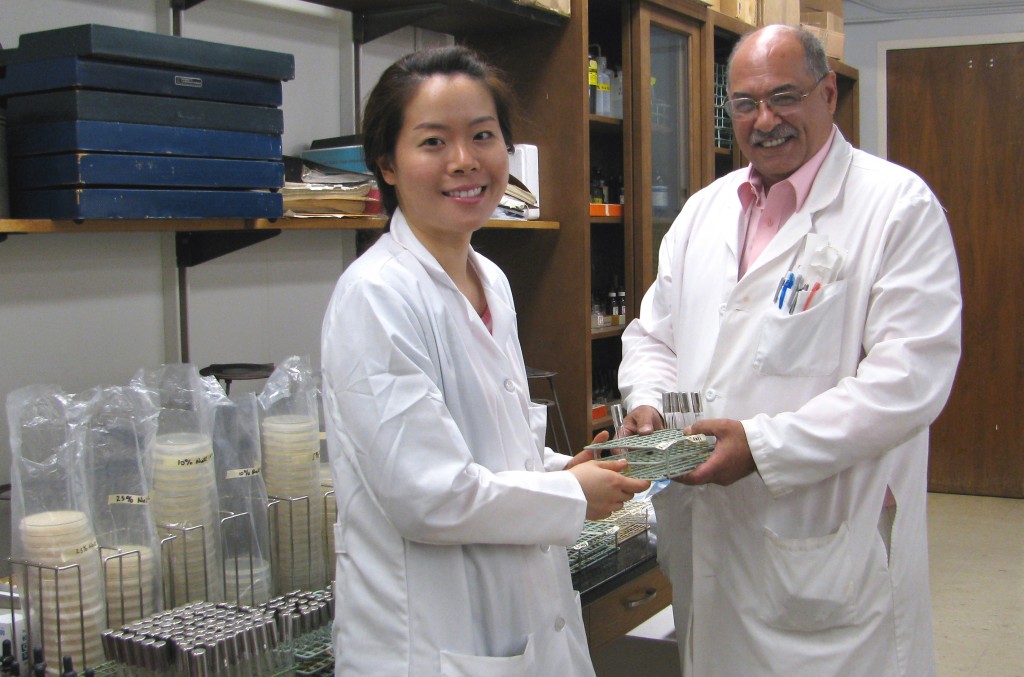The door to Anthony Cipriano’s office in the Natural Science and Mathematics (NSM) building is easily the most knocked-upon door at California State University, Dominguez Hills. Although the room doubles as storage for the six biology laboratories that he oversees, it is also where faculty and students can find one of the department’s most vital resources – Cipriano himself. When he is not maintaining the equipment and supplies for the labs, assisting a professor, or teaching his own students in an Introduction to Biology class, the winner of the first Outstanding Education Support Award at last month’s Staff Awards of Excellence, can be found in his office, ready to collaborate on a project, give advice, or simply to hear a new idea from the professors and graduate student instructors that he supports.

“This is going to happen all day,” he says. “I’m here at 7 a.m. in the morning and leave around 5:30 or so. Most of the time, I’m not even in here, I’m in one of the labs.”
Cipriano, the lead instructional support technician, has one full-time assistant and one student assistant to help manage six labs that are used by CSU Dominguez Hills natural and clinical science students, as well as students from the California Academy of Mathematics and Science (CAMS), which is located on the university’s campus. Their weekly regimen includes prepping media for students to work with in class, setting up and tearing down the labs, cleaning the facilities, storing biohazard waste for eventual removal, and ordering supplies, many of which are perishable specimens whose arrival Cipriano tracks meticulously. Mornings often begin with disassembling labs from the previous evening’s classes. Although the challenges are many, and often with very limited time frames, he says that his goal is to expedite learning as much as possible, going over and above the call of duty.
“There isn’t much that I don’t do,” Cipriano says. “There are two or three professors who I help by proctoring their exams. There are over 100 students in the class, so an extra pair of eyes always helps. I will explain certain techniques to the students, how equipment works. I explain everything to the instructor on how we set it all up, so it will make their job smoother.
“The less deviation from the protocols they have to address, the easier it is for them to get their message across to the students, and the students can have a successful laboratory. We try to minimize the amount of extras that have to be done in the class so that all the students have to do is come in, listen to the professor give the pre-lab lecture, and go to work.”
A New York native, Cipriano left his home in Long Island in the late 1970s for a construction job in Phoenix. A few years later, he made his way to Southern California, where he became an independent contractor before starting a family and settling in Huntington Beach. In 1995, he began attending classes at Cypress College, where he earned his Associate of Arts degree in human services and an Associate of Science degree in biology.
Cipriano transferred to CSU Dominguez Hills to major in biology, achieving his bachelor’s degree in science in 2003 and his master’s degree with an emphasis on molecular biology in 2004. While completing his master’s program, he was asked to help out in the department’s office as an instructional support technician’s assistant. When the lead technician position opened up with the retirement of his predecessor, Stan Noguchi, Cipriano was urged to apply for the job and assumed his current position in 2007. He looks forward to future improvements to the NSM facilities, which are part of the university’s master plan, and hopes to use his extensive experience in the CSU Dominguez Hills biology labs to put his mark on the renovations, as Noguchi had done during the construction of the original building.
“It would be really nice because then our research department would expand greatly,” says Cipriano, who is currently working with Dr. John Carvalho and his graduate student John Vu, to develop modalities for indentifying bacteria. “I would love to get into research, I can diversify even more. I’m also hoping they would allow me to teach another class.”
Cipriano says that he is grateful to his colleagues who nominated him for the Outstanding Education Support Award, and to the university, “for giving me the opportunity to do the things that I really like to do.” He says that despite any challenges on the job, the quality of the faculty and staff in his department has been “a great thing.”
“Everybody in my department works together,” he says. “I’ve been in a lot of different situations, but here it’s like family. The chair, Dr. John Thomlinson, is really good; I can talk to him anytime, about anything. All the professors in the bio department – we get along really, really well. There are people to bounce ideas off of; they come to me, and I go to them. We can count on one another.”
Cipriano says that one of the greatest rewards of his job is when students return to campus and thank him for his mentorship and hopes that their education remains a priority.
“Students are our future,” he says. “They’re the ones who are going to [run] our hospitals and become the scientists and teachers of tomorrow.”